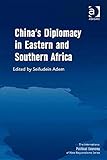China's Diplomacy in Eastern and Southern Africa.
Material type: TextSeries: The International Political Economy of New Regionalisms SerPublisher: Brookfield : Routledge, 2013Copyright date: ©2014Edition: 1st edDescription: 1 online resource (278 pages)Content type: text Media type: computer Carrier type: online resourceISBN: 9781409447108Subject(s): China -- Foreign economic relations -- Africa, Eastern | China -- Foreign economic relations -- Africa, Southern | China -- Foreign relations -- Africa, Eastern | China -- Foreign relations -- Africa, SouthernGenre/Form: Electronic books.Additional physical formats: Print version:: China's Diplomacy in Eastern and Southern AfricaDDC classification: 327.5106 LOC classification: DS740.5.A34 -- .A34 2013ebOnline resources: Click to View
TextSeries: The International Political Economy of New Regionalisms SerPublisher: Brookfield : Routledge, 2013Copyright date: ©2014Edition: 1st edDescription: 1 online resource (278 pages)Content type: text Media type: computer Carrier type: online resourceISBN: 9781409447108Subject(s): China -- Foreign economic relations -- Africa, Eastern | China -- Foreign economic relations -- Africa, Southern | China -- Foreign relations -- Africa, Eastern | China -- Foreign relations -- Africa, SouthernGenre/Form: Electronic books.Additional physical formats: Print version:: China's Diplomacy in Eastern and Southern AfricaDDC classification: 327.5106 LOC classification: DS740.5.A34 -- .A34 2013ebOnline resources: Click to View Cover -- Contents -- List of Figures and Tables -- Notes on Contributors -- Foreword: Africa and China in a "Post-American World" -- Preface -- 1 The Yellow Man's Burden: Race and Revolution in Sino-African Relations -- 2 Trends in Sino-Zambian Relations -- 3 China's Somali Piracy Deployment: Strategic Context and Implications -- 4 Merchandise Trading between Kenya and China: Implications for the East African Community (EAC) -- 5 Perspectives on Sino-Tanzanian Relations -- 6 Sino-Ugandan Relations: Themes and Issues -- 7 A New All-Weather Friend? China's Evolving Relations with South Sudan -- 8 The Logic of China's Diplomacy in Ethiopia -- 9 Impact of the Growing Chinese Foreign Trade on the Economy of Madagascar -- 10 China-Zambia Relations -- 11 China's Foreign Policy toward Africa from the Bandung Conference to the Twenty-First Century (1955-2011) -- 12 Conceptualizing China-Africa Relations: A Conclusion -- Index.
In contemporary discourse on China-Africa relations, there are, on the one hand, the Sino-pessimists who see China as a giant vacuum-cleaner, sucking up Africa's resources in order to fuel its own rapid industrialization, and destroying Africa's development potential in the process. On the other hand, the Sino-optimists see China as the ultimate savior of Africa, capable of or willing to 'develop' the continent. Between the two divergent schools of thought are those sitting on the fence for the time being, the Sino-pragmatists, who are less sanguine for sure about what Africa would gain from China-Africa relations, but are nevertheless willing to reserve judgment until the dust settles. This book is innovative in two ways: it introduces a regional approach to the study of China-Africa relations by focusing on Eastern and Southern Africa; and it puts forward a disciplinary framework- disciplinary in both senses of that term- for interrogating the burgeoning literature about China-Africa relations by conceptualizing the three schools of thought mentioned above.
Description based on publisher supplied metadata and other sources.
Electronic reproduction. Ann Arbor, Michigan : ProQuest Ebook Central, 2018. Available via World Wide Web. Access may be limited to ProQuest Ebook Central affiliated libraries.

There are no comments on this title.